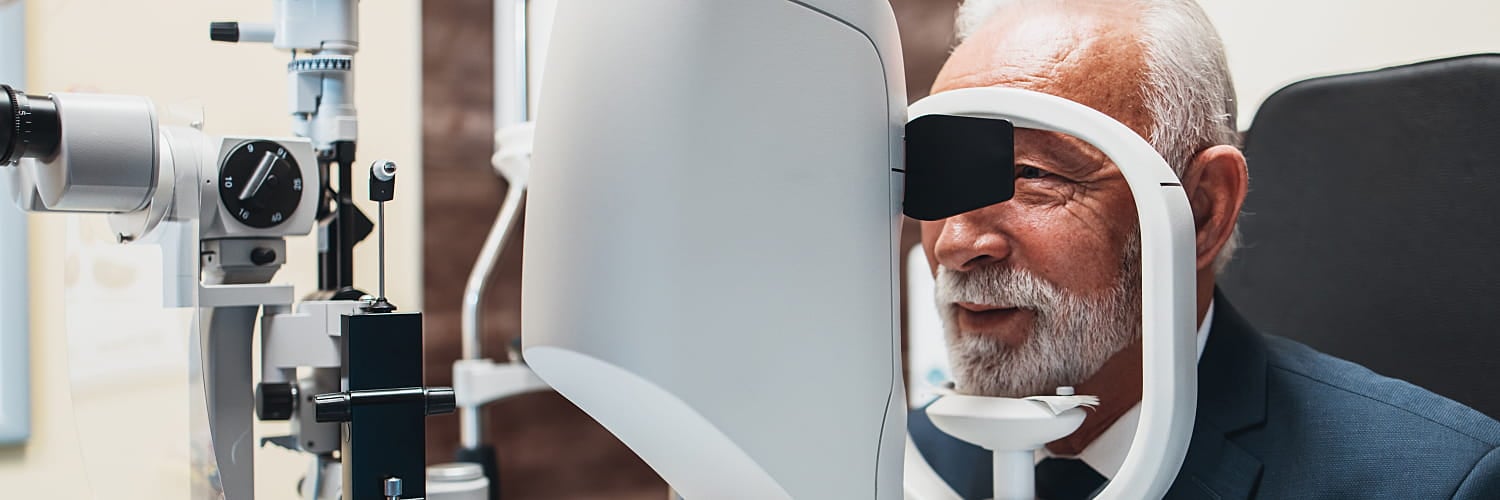You may have regular eye exams with your current private insurance through work, but this might change in retirement. That's because some Medicare plans have limited coverage for vision care.
As you age, it becomes more important to pay attention to your vision. According to the Cleveland Clinic, eye problems, including age-related macular degeneration (AMD), cataracts and dry eyes, can develop in older adults. To help maintain your eye health, regular checkups are important. But does Medicare cover vision care?
The answer varies based on your coverage. Here's what you need to know.
What Vision Care Does Medicare Cover?
In general, the benefits you'll receive from Medicare often depend on the type of plan you have. The same is true for your vision care.
Original Medicare
Original Medicare has two main components: Part A covers hospital and emergency care, and Part B covers standard medical care, such as doctor's visits. With Original Medicare, you won't have coverage for yearly eye exams, eyeglasses or contact lenses. You'll need to pay for these services out-of-pocket.
However, if you have a medical emergency that involves your eyes or vision, Medicare Part A will cover it. Similarly, if you need a vision exam because you've been diagnosed with a condition that affects your eyes, such as AMD, cataracts or diabetes, Medicare Part B will cover eye exams. In these cases, Medicare Part B will cover 80% of the costs, and you'll need to pay the remaining 20%.
Something else to keep in mind is that Medicare Part B will cover some preventive care. For example, if you're at high risk for glaucoma, Medicare covers a preventive screening test each year.
Medigap
Many seniors explore the option of adding supplemental coverage to their Original Medicare plan — this is known as Medigap and helps fill in the "gaps" in Original Medicare plans. There are multiple Medigap plans that provide different levels of coverage depending on where you live.
However, since Medigap plans work alongside Original Medicare, you typically won't find extra coverage for routine vision exams and eye care.
Medicare Advantage
Medicare Part C is also known as Medicare Advantage. A Medicare Advantage plan is run by a private insurer approved by Medicare.
Medicare Advantage plans include everything Original Medicare covers, but they can offer more coverage depending on the plan. For example, many Medicare Part C plans include yearly vision exams and cover some portion of the costs for eyeglasses and contacts.
Keep in mind, though, your monthly premium with a Medicare Advantage plan will most likely be higher than Original Medicare. The types of services, premium costs and benefits vary by plan, so explore your options and choose a Medicare Advantage plan that works for you.
Medicare Part D
Medicare Part D is also known as the prescription drug plan. This part of Medicare doesn't include eye exams. However, if you have Medicare Part D as an add-on to Original Medicare or through a Medicare Advantage plan, you can receive coverage for vision-related prescriptions such as eye drops.
How to Care for Your Vision Now
When thinking about your health for the long term, your eye and vision care should be factored in. The good news is that there are plenty of things you can do now to help protect your vision as you age. Here are a few tips:
- Get routine eye exams. Preventive care is critical as you get older. Exams can help uncover any potential problems early.
- Maintain a healthy lifestyle. Many people living with diabetes suffer from eye problems. According to the CDC, 90% of diabetes-caused blindness is preventable. Eating healthily and exercising regularly can help lower your risk.
- Wear eye protection. When outside, wear a pair of sunglasses. If you're doing any manual work that could put you at risk for eye injury, make sure you wear a set of safety glasses.
- Take breaks. Many people spend all day looking at screens. Be sure to schedule breaks to give your eyes a rest.
Your vision is an important part of your health. Now that you know how various parts of Medicare cover vision care, you can make the right decisions about your healthcare needs before retirement.


 Liz Froment
Liz Froment










